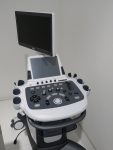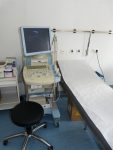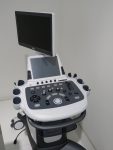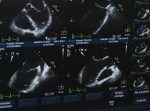
Prior to deciding which school to attend, the most important thing is to do research, related to conditions that the school has for enrollment, the programs offered and their costs, as above all the accreditation.
If you are sure that sonography is a good fit for you, you need to choose an appropriate program that will suit your needs, interests, and desires.
All the important things to consider mentioned above are not as significant when it comes to diagnostic medical sonography, as the accreditation.
In case you enroll in an accredited sonography program, you will be qualified for an exam by which you can earn certification or licensure to become an ultrasound technician.
This is not a requirement in the majority of states, but almost all employers will prefer hiring a person who devoted time and effort to achieve licensure or certification.
Page Navigation
- What is accreditation?
- Who provides accreditation for Diagnostic Medical Sonography programs?
- Is There Financial Aid Available?
- Accredited Diagnostic Sonography Programs Online
- Why choose an accredited program?
- Questions You May Ask Admissions Representatives
- Professional Organizations Within Diagnostic Medical Sonography
What is accreditation?
So as to get an accreditation, an educational institution has to go through a process determined by the accrediting body which demonstrates that the school has achieved a certain level of quality in the education they provide to future sonographers.
The standard the school has to reach is set and approved by an outside or unbiased agency that assures the training and instruction meets quality standards.
Who provides accreditation for Diagnostic Medical Sonography programs?
In the USA, accreditation for ultrasound technician programs is provided by the Commission on Accreditation for Allied Health Education Programs (CAAHEP).
The CAAHEP is the primary accrediting body as it accredits more than 2200 programs in 32 health science careers.
Even though it currently accredits over 200 sonography programs, there are still states that do not have CAAHEP-accredited schools.
So, if you cannot find out a CAAHEP ultrasound school in your geographic area, you should find a school accredited by another accreditation organization.
For accrediting ultrasound programs, the CAAHEP seeks a recommendation from the Joint Review Committee on Education in Diagnostic Medical Sonography (JRC-DMS).
They develop standards in cooperation with a number of other expert institutes and societies related to ultrasound disciplines and concentrations.
The standards an ultrasound program has to meet are related to areas such as faculty qualifications, curriculum, student outcomes, clinical and didactic components, and more.
To meet the JRC-DMS Minimum Expectations for Accreditation, the diagnostic medical sonography program must have the following goal(s):
- “To prepare competent entry-level general sonographers in the cognitive (knowledge), psychomotor (skills), and affective (behavior) learning domains” and/or
- “To prepare competent entry-level adult cardiac sonographers in the cognitive (knowledge), psychomotor (skills), and affective (behavior) learning domains” and/or
- “To prepare competent entry-level pediatric cardiac sonographers in the cognitive (knowledge), psychomotor (skills), and affective (behavior) learning domains” and/or
- “To prepare competent entry-level vascular technologists in the cognitive (knowledge), psychomotor (skills), and affective (behavior) learning domains.”
The recently proposed revisions to the Standards and Guidelines for Accreditation of Educational Programs in Diagnostic Medical Sonography include 2 new learning concentrations: Breast Sonography and Musculoskeletal Sonography.
So as to make interested students able to easily find the CAAHEP accredited program, this organization has provided a very user-friendly tool on their official website.
They can search by profession (from DMS to cardiovascular technology, radiology, and beyond), specialty, and location, and the tool will give them a list that meets the parameters that they have set.
Is There Financial Aid Available?
Once you decide which educational institution to attend, you need to think about how you will pay for the classes.
This is one of the many concerns for both students and parents and many of them decide to apply for a scholarship.
In order to find the most appropriate scholarship for yourself or your child, it is important that you do your research and understand the consequences of your decisions.
You should submit your FAFSA, as it opens on October 1 every year.
It is significant that you submit the report prior to the federal deadline is June 30.
furthermore, have in mind that each state and institution has its own deadlines for financial aid and scholarships.
If you are going to be attending a CAAHEP accredited program, Ultrasound Schools Info even has the scholarship to offer, as well.
Accredited Diagnostic Sonography Programs Online
The CAAHEP has only granted accreditation to 4 programs that offer online or distance learning.
However, sonography is best learned in a hands-on environment, so it is our suggestion to give careful consideration before enrolling in an online program.
Maybe, it will be a better solution to enroll in a hybrid program, where classroom work is done online and clinical placements and lab work are done in person.
Not all online programs are available to people without any experience, as some may be limited to those with previous healthcare/imaging experience and education.
The 4 online or distance programs currently accredited by the CAAHEP are:
- Institute of Ultrasound Diagnostics
One Timber Way
Suite 102
Spanish Fort, AL 36527
Specialty tracks: General Sonography - Washburn University (General/Cardiac)
1700 SW College Ave.
Topeka, KS 66621 - Jackson College (General/Cardiac/Vascular)
2111 Emmons Rd
Jackson, MI 49201 - State Fair Community College (General/Cardiac/Vascular)
3201 W 16th Street
Sedalia, MO 65301
Why choose an accredited program?
We keep on speaking about accreditation, and how important it is when choosing a sonography program, but we have not mentioned why it is so significant.
When choosing an accredited ultrasound program, you can be sure that you will receive a valuable education.
If you graduate from an accreditated school in the health-related disciplines, plus get a certification and licensure, as you will be qualified to sit for a certification exam, you will be the most valued candidate among others applying for a job.
Employers will always give preference to those candidates who have attended an accredited ultrasound program.
So as to meet the educational requirements to sit for a certification exam is either to complete a CAAHEP-accredited program or complete a non-accredited program but meet some extra pre-requisites.
Those requirements can be a completion of an extra year of full time, clinical employment.7
Nevertheless, this will be difficult to reach, as employment can rarely be achieved without a certification.
Questions You May Ask Admissions Representatives
Making a final decision on a perfect ultrasound program for you should not be taken until you talk to an academic advisor, school representative, or sonography department head.
These are the questions you might ask:
- Do I meet the requirements to be admitted into this program?
- Is your ultrasound program CAAHEP-accredited?
- What training and experience do the instructors have?
- For an Associate’s degree, will I be able to transfer credits towards a Bachelor’s degree down the road?
- What is the rate of employment after graduation?
- Does this program adequately prepare me for ultrasound tech/sonographer certification?
- Do I get to choose my clinical placements and will they expose me to different specialties?
- Do you offer students services like academic advising, tutoring, study groups, financial aid, childcare, etc?
- What types of ultrasound labs, equipment, and training simulators do you have on campus?
Professional Organizations Within Diagnostic Medical Sonography
- Commission on Accreditation of Allied Health Education Programs
The primary accrediting body for ultrasound technician programs.
25400 US Highway 19 North Suite 158
Clearwater, FL 33763
(727) 210-2350 - American Registry for Diagnostic Medical Sonography
Primary certification agency for sonographers.
1401 Rockville Pike Ste 600
Rockville, MD 20852
(301) 738-8401 - Society of Diagnostic Medical Sonography
Membership organization offering continuing education courses.
2745 Dallas Pkwy Ste 350
Plano, TX 75093
(800) 229-9506 - Joint Review Committee on Education in Diagnostic Medical Sonography
Member of the CAAHEP, goal to establish and maintain quality standards in education.
6021 University Boulevard, Suite 500,
Ellicott City, MD 21043 443-973-3251








